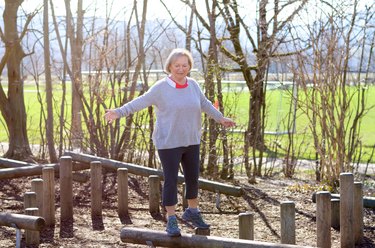
There's never a wrong time to take on a new healthy habit, especially as you start to get older. Making choices that support your physical and mental wellbeing allow you to feel your best right now — and help protect against health problems down the road.
But if the start of a new year has you thinking about making some good-for-you changes, you'll want to begin putting those plans in place.
Video of the Day
Video of the Day
So what exactly can you be doing to stay sharp and spry, both now and in the future? We tapped six health and longevity experts for their top suggestions.
Tackle one or two (or try them all!), and get ready for a feel-good year ahead.
1. Start Your Day With a 30-Minute Walk
Stepping outside for a daily walk supports your physical and mental wellbeing.
"It provides an opportunity to get outside the house, enjoy fresh air and possibly even converse with neighbors," says Michael Green, MD, an ob-gyn at Winona, a female-founded anti-aging wellness center in Austin. "Additionally, it helps keep the joints lubricated and cardiovascular system working optimally."
Getting out first thing in the morning means your walk won't get derailed if something unexpected comes up later on. Plus you'll get more natural light exposure, which can help combat the winter blues.
Related Reading
2. Go Big on Veggies
If you're used to plates containing mostly protein and starch and just a little bit of green (or none at all), try switching your ratios.
Healthy-aging nutrition expert Kate Piper, RDN, recommends filling half of your plate with vegetables (or vegetables and fruit) at mealtime. "The antioxidants in fruits and vegetables fight chronic inflammation, a contributor of chronic diseases like heart disease, diabetes and dementia," she says.
3. Challenge Your Brain Daily
To keep your noggin sharp, "try to do one thing each day that requires problem-solving or allowed your brain to experience something new," recommends Austin Perlmutter, MD, coauthor of Brain Wash and senior director of science and clinical innovation at Big Bold Health.
Games like crosswords or sudoku fit the bill, but so do things like practicing an instrument, learning a foreign language or having a novel experience like visiting a new museum or taking a different route home from work.
"When we're exposed to novelty and cognitive challenges, we activate brain networks that provide resilience to conditions like cognitive decline," Dr. Perlmutter says. (Not sure how to get started? Try this seven-day kickstart plan for better brain health.)
4. Do Weight-Bearing Exercises 3 Times per Week
Exercises that develop and maintain muscle tone, bone density, balance and coordination reduce the risks of chronic injuries and fatal falls or accidents, according to the National Institute on Aging (NIA).
"Ultimately, they improve your quality of life and longevity by extension. This is why we encourage even our seniors to continue incorporating these workouts into their regular routines," says Nancy Mitchell, a geriatric registered nurse and contributing writer at Assisted Living Center.
If you're new to strength-training, these exercises can help you get started.
5. Use a Smaller Plate
"Eating smaller portions can help you maintain a healthy weight as you age," Piper says.
One easy way to do that: Swap your typical dinner-sized plates for more modestly-sized salad ones, which makes it easy to trim your calorie intake without feeling like you're cutting back. "Smaller portions feel different psychologically when eating off a smaller plate. So you'll end up eating less," Piper says.
6. Make Mocktails Your Go-To
It can be fun to celebrate with a drink at a special event or occasion. But it's important to keep in mind that alcohol can have a bigger impact on your health as you age, says Christine Kingsley, APRN, an advanced practice registered nurse with the Lung Institute in Manchester, Connecticut.
You might feel the effects of booze more strongly than when you were younger, which can up the risk for falls or fractures. Over time, too much alcohol can also increase your risk for some cancers, osteoporosis, diabetes and memory loss, per the NIA.
Kingsley's advice: Switch to non-alcoholic drinks more often. Consider making your own mocktails with sparkling water and fruit juice, or explore the growing world of non-alcoholic wines and cocktail mixers.
7. Commit to Connection
Make it a point to engage with others every day in a way that leaves you feeling emotionally nourished. "Volunteer, join a walking or hiking group, form a book club or take a group trip," suggests Shannon Leggett, PT, owner of Shannon Leggett Physical Therapy in New York.
Social isolation can increase the risk for serious health problems including high blood pressure, heart disease, obesity, a weakened immune system, anxiety, depression, cognitive decline, Alzheimer's disease and even death, according to the NIA. But maintaining social ties and a sense of connection can increase a person's chances of survival by up to 50 percent, per a landmark July 2010 review published in the journal PLoS Medicine.
8. Try Forest Bathing
Despite what the name might sound like, forest bathing is just the simple act of spending time immersed in nature. You'll reap cardiovascular perks if you're walking or hiking, but exposure to the natural world can protect your health as you age in other ways too.
"Forest bathing can decrease stress levels, which play a role in boosting one's immunity," Kingsley says.
It can help support healthier blood pressure (which naturally rises with age) too, according to an August 2017 review published in BMC Complementary Medicine and Therapies.
- National Institute on Aging: "How can strength training build healthier bodies as we age?"
- National Institute on Aging: "Facts About Aging and Alcohol"
- National Institute on Aging: "Social isolation, loneliness in older people pose health risks"
- PLoS Medicine: "Social Relationships and Mortality Risk: A Meta-analytic Review"
- BMC Complementary Medicine and Therapies: "Blood pressure-lowering effect of Shinrin-yoku (Forest bathing): a systematic review and meta-analysis"
Is this an emergency? If you are experiencing serious medical symptoms, please see the National Library of Medicine’s list of signs you need emergency medical attention or call 911.








